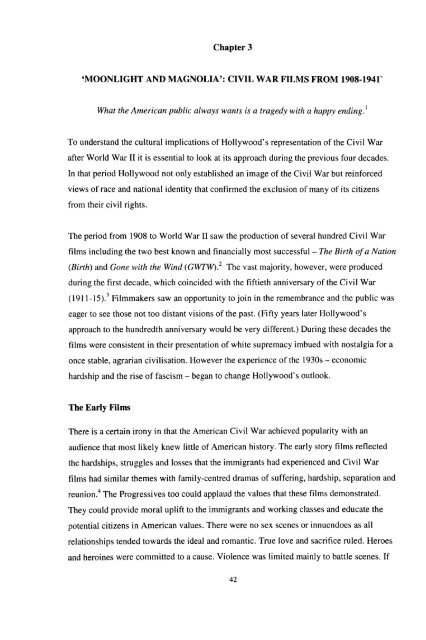- Page 1 and 2: Greenwich Academic Literature Archi
- Page 3: REEL WARS: COLD WAR, CIVIL RIGHTSAN
- Page 6 and 7: ABSTRACTThis study is an examinatio
- Page 8 and 9: ABBREVIATIONSAMPASAHRBirthCommissio
- Page 10 and 11: Historians using film as a resource
- Page 12 and 13: dominated America's foreign policy
- Page 14 and 15: Mary L. Dudziak explores this relat
- Page 17 and 18: pure and simple' and were therefore
- Page 19 and 20: historical texts. Hayden White comp
- Page 21 and 22: Historians, history films and film
- Page 23 and 24: How have sympathetic film historian
- Page 25 and 26: Therefore historians can, with over
- Page 27 and 28: identity and these were taken as th
- Page 29 and 30: 21 George F. Custen, 'Hollywood and
- Page 31 and 32: 63 Rosenstone, The Historical Film,
- Page 33 and 34: of Honor dedicated to, and listing,
- Page 35 and 36: War.....[it] defined us as to what
- Page 37 and 38: The Civil War and popular cultureJu
- Page 39 and 40: memory,53 the place where Union and
- Page 41 and 42: Despite being a new medium Hollywoo
- Page 43 and 44: From the late 1940s Hollywood was u
- Page 45 and 46: 1 William Faulkner, Requiem for a N
- Page 47 and 48: 36 Blight, Race and Reunion, 77, 81
- Page 49: mainly composed of members of the w
- Page 53 and 54: This was another Lost Cause myth -
- Page 55 and 56: stuff with plenty of clothes, rich
- Page 57 and 58: women into or within slavery. 47 Th
- Page 59 and 60: departure when, in the discussion o
- Page 61 and 62: 1 William Dean Howells, Los Angeles
- Page 63 and 64: 37 Melvyn Stokes, The Civil War in
- Page 65 and 66: All races and religions, that's Ame
- Page 67 and 68: Hollywood almost abandoned Civil Wa
- Page 69 and 70: charged with disloyalty and silence
- Page 71 and 72: ecover from the HUAC investigations
- Page 73 and 74: a living. The daughters grow up to
- Page 75 and 76: Gettysburg. 'You know,' says Henry,
- Page 77 and 78: combining two great myths, which co
- Page 79 and 80: (1948), Tom Dunson's style of autoc
- Page 81 and 82: Patriotism became a white attribute
- Page 83 and 84: In the absence of African Americans
- Page 85 and 86: (Horizons West) and businessmen (An
- Page 87 and 88: year later, and there was no lead f
- Page 89 and 90: 20 Mary L. Dudziak, Cold War, Civil
- Page 91 and 92: 56 Richard White, 'Western History'
- Page 93 and 94: 7 have seen the promised land.' 'Th
- Page 95 and 96: those between whites and African Am
- Page 97 and 98: change, to forget what made him, he
- Page 99 and 100: eported that the film had 'already
- Page 101 and 102:
campaigning for Lincoln. John's rea
- Page 103 and 104:
lack/white relationships, in Civil
- Page 105 and 106:
McCarthy discredited and a more rel
- Page 107 and 108:
dispute which once divided our nati
- Page 109 and 110:
pressure, continued to hold. The me
- Page 111 and 112:
discrimination, attempts at univers
- Page 113 and 114:
talks about Lincoln pleading that '
- Page 115 and 116:
creativity. The Confederates use a
- Page 117 and 118:
police in Birmingham and Kennedy's
- Page 119 and 120:
1 Martin Luther King Jr.'s, speech,
- Page 121 and 122:
44 Blight, Race and Reunion, 8-11,
- Page 123 and 124:
- self-belief, reasons for fighting
- Page 125 and 126:
Sexploitation - which reversed the
- Page 127 and 128:
would surely recognise the Mexicans
- Page 129 and 130:
There are similar examples in Major
- Page 131 and 132:
on working class whites nor receive
- Page 133 and 134:
The conflict between civil rights a
- Page 135 and 136:
e trusted from the wiles of the mis
- Page 137 and 138:
field-hands are too valuable an inv
- Page 139 and 140:
moving the civil rights agenda to a
- Page 141 and 142:
McBurney, even though he is wounded
- Page 143 and 144:
Most reviewers were sympathetic, se
- Page 145 and 146:
conservatism,' as a natural ally fo
- Page 147 and 148:
By the early 1970s, Hollywood's opt
- Page 149 and 150:
20 Enoch, in Friendly Persuasion (1
- Page 151 and 152:
62 Johnson called what happened the
- Page 153 and 154:
The world is white no longer; and i
- Page 155 and 156:
proceed with civil rights legislati
- Page 157 and 158:
would have been counter to the poli
- Page 159 and 160:
mid-1990s was rejected as the compa
- Page 161 and 162:
those historians who were contestin
- Page 163 and 164:
1 James Baldwin, Stranger in the Vi
- Page 165 and 166:
39 Robert Brent Toplin, Reel Histor
- Page 167 and 168:
1210mmmto3sCT>The number of America
- Page 169 and 170:
There is a third problem - that of
- Page 171 and 172:
the Library of Congress and the Uni
- Page 173 and 174:
mainly contain copies of correspond
- Page 175 and 176:
killing. There were two other areas
- Page 177 and 178:
are 'no compensating moral values a
- Page 179 and 180:
epresented.' 32 However, this was t
- Page 181 and 182:
Reference has already been made to
- Page 183 and 184:
It is in the final period that anti
- Page 185 and 186:
22 Letter from Shurlock to William
- Page 187 and 188:
Year Director Company190819091910Ba
- Page 189 and 190:
191119121912Grant and LincolnHe Fou
- Page 191 and 192:
19131913Call to Arms, TheCarpenter,
- Page 193 and 194:
1915 Birth of a Nation, TheColonel
- Page 195 and 196:
19341935193619371938193919401941194
- Page 197 and 198:
Searchers, TheShowdown at AbileneTh
- Page 199 and 200:
Alien, Robert C., and Douglas Gomer
- Page 201 and 202:
Cassidy, John M., Civil War Cinema:
- Page 203 and 204:
Foner, Eric, Who Owns History, (New
- Page 205 and 206:
Landy, Marcia, (ed.), The Historica
- Page 207 and 208:
Prince, Stephen, A New Pot of Gold:
- Page 209 and 210:
Sternsher, Bernard, Consensus, Conf
















